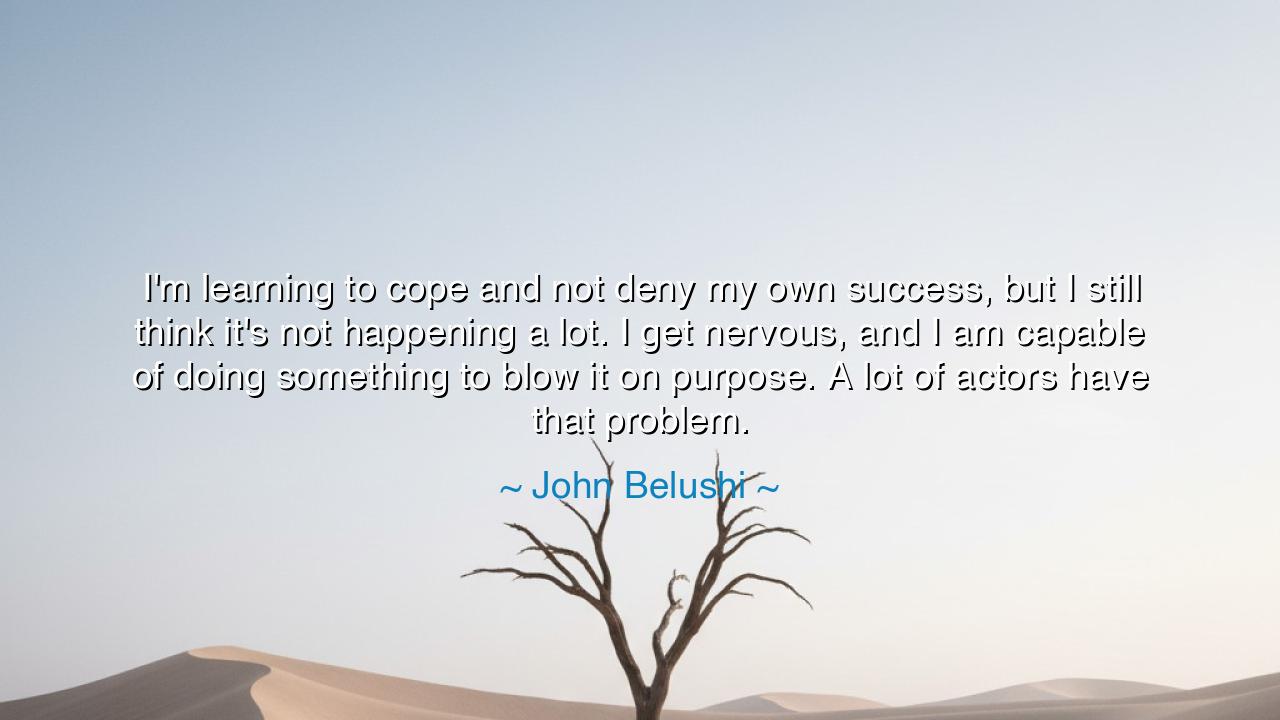
I'm learning to cope and not deny my own success, but I still
I'm learning to cope and not deny my own success, but I still think it's not happening a lot. I get nervous, and I am capable of doing something to blow it on purpose. A lot of actors have that problem.






In the raw and vulnerable confession of John Belushi, we hear the trembling voice of one who stood in the light of success yet could not fully believe in its warmth: “I’m learning to cope and not deny my own success, but I still think it’s not happening a lot. I get nervous, and I am capable of doing something to blow it on purpose. A lot of actors have that problem.” Beneath his humor and brilliance, Belushi reveals the eternal struggle between greatness and self-doubt — between the gift of achievement and the fear of not deserving it. His words, spoken in a moment of candor, unveil a truth that echoes across ages: that even those who rise high can be haunted by the fear of falling.
To deny one’s success is a subtle form of self-sabotage, born from the illusion that we are unworthy of the good that life grants us. Belushi, like many artists, lived at the edge of genius and fragility. The laughter he gave to the world masked the silent war within — a war between confidence and uncertainty. His words remind us that fame and accomplishment do not silence insecurity; in fact, they often magnify it. For those who shine brightly, the shadows grow deeper, and the heart must learn to bear both light and darkness without collapsing under their weight.
The ancients would have recognized this as the battle of the self against the self. In every age, those who achieve greatness are tested by their own reflection. The warrior who wins a thousand battles may still doubt his worth when peace descends. The poet who writes beauty into the world may still believe himself empty when the pen falls silent. So too did Belushi wrestle with this inner paradox — to be admired by millions yet unable to embrace that admiration as truth. It is the same fear that plagued kings, prophets, and artists alike: the fear of being an imposter in one’s own triumph.
Consider the story of Vincent van Gogh, whose paintings now hang in the world’s grandest galleries, but who in life sold only one canvas and lived in despair. He painted with the fire of revelation, yet could not believe in his own brilliance. Like Belushi, he was caught between creation and self-doubt, between genius and self-destruction. His art was immortal, but his faith in himself was mortal and fragile. This is the tragedy that Belushi’s words reflect — the torment of those whose outer success outpaces their inner peace.
To cope, as Belushi says, is not merely to endure, but to strive toward acceptance — to learn how to hold one’s own success without fear of losing it. Many artists, he notes, share this struggle, for they live from the heart’s core, where feelings burn too brightly. To create is to expose the soul; and when the world praises that exposure, the soul recoils, unsure whether the love is for the person or the performance. The ancients would say that such a heart must learn the discipline of self-knowledge — the courage to see one’s worth without vanity, and one’s flaws without despair.
Belushi’s admission that he was “capable of doing something to blow it on purpose” reveals a truth both tragic and profound. It is the instinct of the fearful heart to destroy what it cannot believe it deserves. This, too, is a lesson as old as humankind: that self-doubt, left unhealed, becomes self-sabotage. The gods of myth punished hubris, but the mortals of reality often punish themselves — tearing down their own altars, extinguishing their own fires. Belushi’s words, spoken not in arrogance but in anguish, remind us of the sacred duty to nurture the mind as tenderly as the body, and to protect the spirit from its own storms.
So, my children of striving and of doubt, take this wisdom into your hearts: learn to accept your light. Do not run from your success as if it were a trick of fate. Stand in it, humbly but firmly. Let gratitude replace guilt, and learning replace fear. When the voice of doubt whispers that you are not worthy, remember that every gift carries both burden and grace, and that mastery lies not in denial, but in balance.
Thus, let John Belushi’s words be your mirror and your warning: “I’m learning to cope and not deny my own success…” Learn to cope, yes — but not by shrinking. Learn to cope by growing into the fullness of who you are meant to be. For the world needs not perfection, but authenticity; not flawless idols, but flawed souls who dare to keep creating even while afraid. In accepting your own success, you honor the divine spark that gave it to you — and in doing so, you ensure that your light does not burn out, but burns on, eternal and true.






AAdministratorAdministrator
Welcome, honored guests. Please leave a comment, we will respond soon